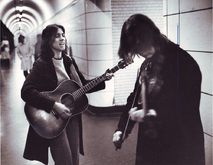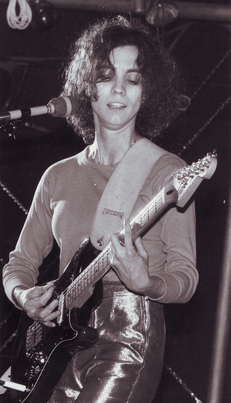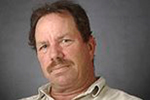.jpg)
“The Life and Times of Destiny Quibble” album collection of three environments and 18 songs chronicles a musical world, beginning in Chicago 1982-1988. This retrospective pays tribute to the musicians, engineers, and friends of Destiny Quibble over 29 years – who helped make the music happen – and culminates with two cover songs and three original songs that feature World Nation® children’s choirs from the Iowa-Illinois Quad-Cities (1991-1992); Parker, AZ (1993-1996); and the Tampa Bay area in Florida (in various forms since 1997).
Time travel back to the 1980s. Next stop, Halsted Street. Chicago in the 1980s, when this musical journey began, was home to legendary blues, rock, jazz, R&B, neo-wave, punk, industrial music, experimental pop, house, hip hop. Singing in the subways and playing on the streets, Destiny Quibble, fellow musicians, and friends (like attorney Rob Wynbrandt and journalist Zay Smith) put a stop to arrest of street and subway performers by advocating for First Amendment rights, playing out through three mayoral campaigns. Eventually street & subway performance was legalized in Chicago. Still is, but with new fees and new challenges that come with working within the system. Multimedia productions were the foundation of Quibble’s early work, which was often performed in art galleries like Randolph Street Gallery. Destiny Quibble & the Street performances – such as “Public Rehearsals,” “Illustrated Music,” and “Planned Accidents” – included poetry, songs, film, slides, dance, and sometimes guest artists discovered on the streets of Chicago. Her first recordings were engineered at Chicago Trax. Quibble recalls:
“When I met Iain Burgess, I knew that he was the right engineer for my first EP vinyl album, “Public Rehearsals,” a work of three environments and four songs, released in 1983. Iain was innovative and supportive of new artists. I linked that he had musical roots in England and was a perfectionist who made the best out of anything that came to him. In our case, we recorded at the original 16-track Chicago Trax studio before they moved to Halsted Street. Like other cash-strapped band, the owners Reid and Buster helped make it happen by offering us the graveyard (midnight to 6 a.m.) recording time slot at a significant discount. So, all of our songs on that EP were recorded in the wee hours of midnight to dawn.”
As a past busker in Harvard Square (Cambridge, MA), on the Staten Island Ferry, and in the Village of New York City, Quibble found it was a great way to get immediate audience feedback as well as some extra cash. However, Chicago was different. After seeing fellow musicians arrested by Chicago police officers, she managed to get an attorney to take up the cause and help her work toward legalizing street performance. She found attorney Rob Wynbrandt through Lawyers for the Creative Arts because her annual salary qualified her for these services. Quibble also enlisted the help of Chicago Sun-Times reporter Zay Smith, who kept reporting on the story until people paid attention.
Quibble said she was first motivated to get involved with Chicago politics in this battle over First Amendment rights because “some of the talented women who performed in the subways and on the streets were being arrested, and they needed that income to feed their kids.” She also knew of many great musicians and singers – Billie Holiday, Louis Armstrong, Violent Femmes, B.B. King, Tracy Chapman, Jewel, and others – who got their start as street performers.
For the album, Quibble used an eclectic group of musicians including violinist David Smith, who she met while performing in the Chicago subways. He opens this album with his classical violin playing in the subway over an arriving subway train. David is also featured later on the EP in a rapid-fire poem-song called, “Ha.” Haring brought in two Conservatory music students she had met, Ross Feller and Thymme Jones, who were featured on “Believed What You Said” and “Street Birds.” Quibble says: “I loved the way that they would interweave their instrumental lines. When they played together, there was a merging of heart and mind that created a collage of musical colors so rich and dynamic, it was as if one person were playing.”
The rhythm section for the album was grounded in the versatile and ever-solid drumming of Phil Gratteau and the inspired, melodic bass lines of Rick Goodreau. “At that time,” says Haring, “I always played the electric rhythm guitar.” Rich Coropolgo added a special flavor to the song, “Shoes,” with his rich, flowing clarinet solo.
“Iain was the mixing master who really helped me mold the production work of Public Rehearsals into a whole,” says Quibble, “and this is the way we performed live as well. It was like a soundtrack for a movie.” Their “live” shows at the Noise Factory, Randolph Street Gallery, Gaspar’s, Broadway Jacks, Fitzgerald’s, Cubby Bear, the Smart Bar, Stage West and other clubs often followed this Destiny Quibble story of beginning in the subway, traveling to the street, and eventually taking off into the starry night.
Enter Fever Records and Cole Kendall. Cole came to see us at one of our shows, and soon we joined a handful of bands that were signed by Fever Records. We were ecstatic. For our live shows, we added Danny Czerwinski on drums and Ron Rutherford on keyboards and vocals with Laurie Marino Sears on saxophone, flute, clarinet, and oboe. This band was featured on their Fever Records 45 “She Told Me” b/w “Face of the Clock,” recorded at Chicago Trax with Joe Tortorici engineering. People are surprised to know that “She Told Me’ was actually inspired by her grandmother who lived in Preston, Iowa.
“My siblings and I felt like we knew everyone in that town personally, the family feeling in Preston was that close,” says Quibble. “My grandmother and I had a very deep bond. She was a great teacher and a gifted storyteller. Like my mother, she always encouraged me to do my best, stay positive, have dreams and reach for them.”
One of Quibble’s primary collaborators on the album was Howard Kongsgaard, who co-wrote three songs on the album: “Ohhaaa,” “Black Line Highway,” and “Not Be Realized.” She describes sitting at synthesizers with Howard for hours, sometimes all day – while, sampling, mixing, singing, and recording – working in an intensely creative process of interweaving song melodies, vocals, keyboard lines, sampling, and musical atmospheres. Cole Kendall shared the Quibble/Kongsgaard song, “Ohhaaa,” with producer Steven Lambright who included it on his Heat from the Wind Chill Factory album, released by the WNUR radio station at Northwestern University in Evanston.
Guitarist Kim Schwartz was known and respected as a musician as well as a luthier in Chicago. He built classical guitars, four and five-string electric basses, six and twelve-string electric guitars, and even invested some instruments such as the sitar-guitar. The Destiny Quibble Band evolved to include Kim on studio recordings and on stage and, at one point, Destiny and Kim partnered with Jon Wilk, an assistant engineer at Chicago Trax. Quibble and Wilk co-wrote, “Heart of Our Mind,” which she says, “lyrically and aesthetically reflected a change in my life direction toward an increasing interest in spirituality,” a song that she describes as having “a sense of poetry and music at the same time.”
As the band continued to evolve, drummer Ardie Rowe came on board. He appears on two album songs: “All I Ever Really Wanted” and “Punch Press,” one of Quibble’s favorite songs on the album for its “force and fury in making a statement in favor of freedom and individuality.”
“Punch Press was inspired by a conversation I had with Howard about these machines that punch out molds of things exactly alike,” says Quibble. “I thought it was a good metaphor for life expectations and situations that try to make clones of us all, as expressed in the lines: you cannot standardize my brain, my words, my thoughts, my dreams, my name, it’s like a punch press coming down inside my mind. It was my proclamation that we should resist that.”
During this time, Quibble often spoke of “waking up one night during a club performance realizing that she was basically selling drinks,” rather than being valued for the music and creative artistry of her band. Perhaps due to the influence of a new meditation and yoga practice, she says that at one point she wanted to “escape her own creation” as her life expression had become so external through constant public performances in late night clubs. She describes “a longing for the peace and quiet of an inner experience.” So, in 1988, she sold her Marshall guitar amp to get money to help fund a trip to stay at an ashram in India. She was there for three months, and it proved to be a life-changing experience for her. When she returned to Chicago she started working with a talented singer named Juliet, performing as an art pop duo under the name of Scheherazade, at city festivals, special events, and neighborhood celebrations.
“Juliet and I both wrote songs, sang, programmed parts, and played bass, drums, keyboards, and guitar – two women making such a large, full band sound,” recalls Quibble. “I only wish that we had recorded some of our great songs from this collaboration period, but we did not.”
Soon Quibble returned to her hometown of Davenport, Iowa, where she focused on meditation and contemplative reading, while continuing as an ESL teacher for the local community college. This period of respite lasted two years until, Quibble says, she “was called back to music by my ESOL students at an elementary school in Muscatine, Iowa.” Working with Rev. Gene Augustine and members of a community organization, Reaching Across Divisions, Quibble (now going by her legal name of Cynthia Haring) formed a Culture Club for students at her school to sing, dance, write songs, and share foods from their native countries.
Haring wrote an ESL theme song, “The Calling,” to give her students a positive anthem: we’re calling everyone we see, to join our quest for unity, we’re calling friends and families, to help us live more lovingly, as she encouraged them to celebrate their roots, their culture: World Nation is every race, culture, country, religion, faith; world nation’s songs we sing, to you our open hearts we bring. Meanwhile, Haring was keenly aware of the impact and influence of local gangs on the lives of vulnerable kids in the community, and she hoped that her World Nation endeavor would serve as a diversion and provide “a positive, creative outlet for these children.”
Cynthia Haring and World Nation released their first recording, “Welcome to Our World,” in 1992. One song, “The Calling,” from that album appears in the Life & Times of Destiny Quibble collection, featuring kids and teens from the Iowa-Illinois Quad-Cities. This group, from Haring’s hometown area, was officially her first World Nation music group. Two other original songs, “Walking in a Memory,” featuring her Parker World Nation music group (1995) and “Don’t You Let Your Baby Down,” featuring her current Tampa Bay World Nation group (2011), are also included in the Quibble collection.
One other original song, “Dos Corazones” (Two Hearts) – the only song sung in Spanish and English – appears on the album, featuring master Indian percussionist Anand Shiva Mani. Finally, Haring says that, at the suggestion of her longtime friend Jessie Ewing, she decided to add two cover songs” “Up on the Roof” and “So Much in Love,” which proved to be a foreshadowing of future traditional pop World Nation albums to come, 2013-2017.


.e32741764e71000b8ecd2cdc1130605974.jpg)


CD Release Party for
“Life & Times of Destiny Quibble”
a 29-year music retrospective

Springstead High School ESOL teacher Cynthia Haring sings with multicultural students.
Students will Celebrate 29 Years of a Troubadour's Music
Logan Neill, Times Staff Writer
Thursday, September 8, 2011
SPRING HILL — For nearly 20 years, Cynthia Haring has made her living instructing children for whom English is a second language. But getting them to communicate with others who don't speak their native tongues wasn't always easy. One of the more important things Haring has learned through her experiences is how music can help in that effort. She often brings her guitar into the classroom and has her students collectively join in with her, singing popular folk and pop songs. Back in 1991, it was through those sing-alongs and her desire to have a musical culture club that Haring came up with the idea of creating a multicultural group called the World Nation Singers. From 1997 through 2002, she led an ensemble here from Powell Middle School for local performances at festivals around the region.
Several of those now-grown singers will join Haring and Tampa Bay World Nation at 6 p.m. today at the Lake House in Spring Hill to celebrate the release of The Life and Times of Destiny Quibble, a 21-track retrospective CD that details Haring's 29-year career as a singer-songwriter and community music organizer. Haring said she has enjoyed quite a musical ride during her lifetime. A former busker who performed under the name of Destiny Quibble in the subways of Chicago during the 1980s, she was at the forefront of a movement to convince city officials to overturn a ban on street performers.
"Back then, you could get arrested just for playing a guitar on a street corner," recalled Haring, 48. "We felt it was a violation of our First Amendment rights. We organized protests, hired lawyers, and bugged them until they finally gave in." A multilingual specialist who currently works as an English to Speakers of Other Languages teacher in Pasco County, Haring spent years dividing her time between teaching and playing music. By 1991, she decided to work toward release of World Nation’s first album, while teaching English to multicultural children in Iowa and, in 1995, she released a second World Nation album in Arizona before settling in Florida in 1997. "I thoroughly enjoy working with kids from different cultures and backgrounds," said Haring. "Helping them put their heritage into music is such a thrill for me."
Haring's latest group, Tampa Bay World Nation, is a vocal ensemble made up of kids from Hernando and Pasco counties. This year, she arranged to take the group into Morrisound Studios in Tampa to record an album called Cruisin’ in My Wagon: A Journey Through Doo Wop and More. "I'm so happy to have been able to provide them that opportunity," Haring said. "It's an experience none of us will ever forget."
 Haring's release party this evening will be at the Spring Hill Community Association's Lake House at 1202 Kenlake Ave. in Spring Hill. Admission is free. Proceeds from the sale of CDs will support meditation programs for prisoners and the Destiny Quibble Foundation's Cocobolo Project for health and the healing of cancer patients.
Haring's release party this evening will be at the Spring Hill Community Association's Lake House at 1202 Kenlake Ave. in Spring Hill. Admission is free. Proceeds from the sale of CDs will support meditation programs for prisoners and the Destiny Quibble Foundation's Cocobolo Project for health and the healing of cancer patients.


